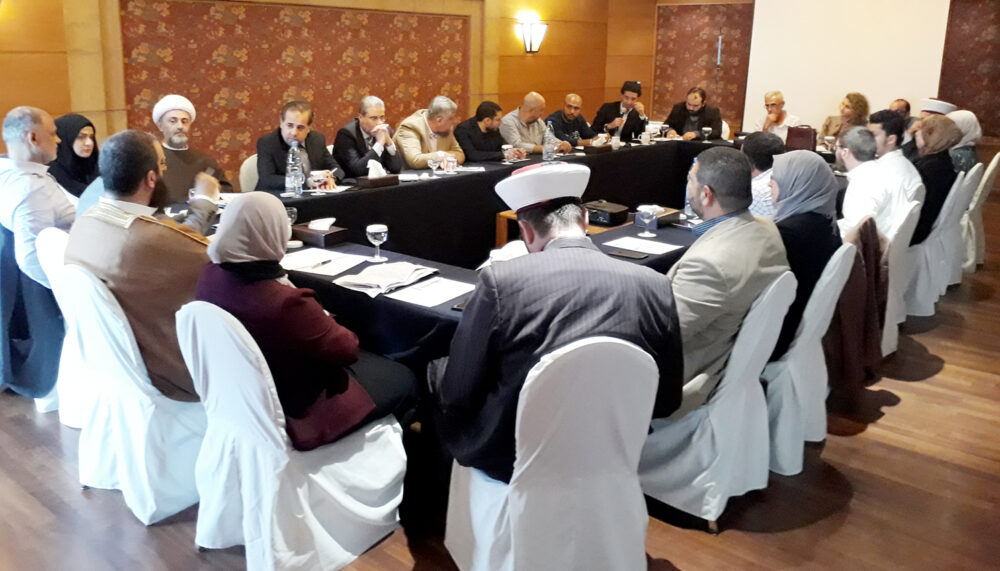PAST PROJECT
Supporting the establishment of safety nets against polarisation of Sunni-Shia relations in Lebanon

This project aims to create forums and to establish safety nets which contribute to bridging divides and addressing mutual concerns and fears.
Timeframe: 2017 - 2020
Religious, sectarian and political polarisation has been on the rise in Lebanon lately – also against the background of increasing regional tension. This is reflected on the social level in Lebanon where many Lebanese, especially Sunni and Shia Muslims, feel the effects of this tension. In addition to regional and local politics, media and social media also play a role in aggravating – sometimes even creating – sectarian polarisation as it may serve political, electoral or regional interests. Despite numerous attempts to address the Sunni-Shia rift, few efforts for bridging the gaps and exploring areas of rapprochement seem to have been sustained over time to allow for rebuilding trust and facilitating communication between the two groups.
Although Lebanon is a country with a rich experience in political, inter-community and inter-religious dialogue, there are few active forums for Sunni and Shia representatives in the social, political, religious and (social) media fields for structured informal exchanges to reduce increasing polarisation.
Accordingly, the project “Supporting the Establishment of Safety Nets against Polarisation of Sunni-Shia Relations in Lebanon” aimed to create such forums and to establish safety nets which contribute to bridging divides and addressing mutual concerns and fears. In addition, the project aimed to develop ways to ease tensions between both sides and to support constructive relationship-building.
Background
Sectarianism is built into the political and societal system in Lebanon and entrenched in community relations. Yet, currently tools and forums for constructive and change-oriented political and social participation of Lebanese are limited and inefficient. Against this background, the project engages in consultations with different groups in both communities in order to explore interest, readiness and potential of a more structured, exploratory and informal dialogue between Sunni and Shia representatives in Lebanon. The project seeks to provide a forum for discussing current challenges of Sunni-Shia relations and to develop ideas for safety nets to reduce tension.
The project has the following concrete objectives:
- To contribute to developing Lebanese owned and driven approaches and mechanisms to ease sectarian tension and create safety nets for constructive relations between both communities
- To develop key principles and concrete alternative messages to promote non-exclusionary identity conceptions and shared values of citizenship
- To help building common ground for constructive messaging and to advocate for non-discriminatory and non-exclusionary identity conceptions among constituencies
- To provide a space for activists with a media and religious background to analyse the patterns of sectarian messaging on the internet, to disentangle the religious and political dimension and to address inciting speech.
Based on intense consultations, different thematic groups were formed and meet regularly.
Partners and funding
The project is supported by the Swiss Federal Foreign Office and the Norwegian Ministry of Foreign Affairs (for more information, see the full funding agreement).
Activities
The project activities fall under the following four main tracks:
- Core Group of eminent personalities: Representing a broad spectrum of perspectives, priorities, and constituencies within the Sunni and Shia communities, and trying to develop recommendations and mechanisms to depolarise Sunni-Shia relations. This mixed group of eminent women and men from all across Lebanon is an attempt for creating a safe informal space for regular exchange and trust building.
- Religious Education Working Group: A committee of Sunni and Shia school administrators and educational experts who published a manual on “Common Values” to be introduced to Sunni and Shia schools and worked together in conducting pilot trainings with more than 100 students.
- Dialogue and Mediation Working Group: Made up of scholars, experts, and practitioners (with a religious or practical background) who discussed conceptual foundations of dialogue and mediation in Islam and published their ideas in a book titled “Dialogue Opportunities and Challenges to Enhancing Sunni-Shia Relations”.
- Social Media Working Group: Based on discussions with the interlocutors in the three aforementioned tracks, an additional component was developed focusing on Sunni-Shia polarisation in media and social media. “Developing Safety Nets against Polarisation of Sunni-Shia relations with a particular focus on (social) media discourse” aims to ease sectarian tension on social media which has proven to be not only a reflection of the tension in the country but also a polarizing tool in and of itself.
Publications from this project:
In the context of the different project components, the following publications were developed:
- Dialogue and Mediation Handbook titled “Dialogue Challenges & Opportunities to Enhancing Sunni-Shia Relations” which comprises 10 studies and articles by Sunni and Shia experts including religious figures, academics and journalists.
- Two short manuals on Common Values: one for schools, one for adult / official groups.
Project lead
Sonja Neuweiler
Senior Advisor
email hidden; JavaScript is required
Team members
Media contact
You can reach the press team at:
+49 (0) 177 7052758
email hidden; JavaScript is required


